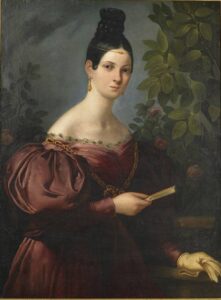
Spanish mezzo-soprano María Malibrán (1808-1836) performed to great critical acclaim on the opera stage in London, Paris, Rome, Naples, New York, and Milan. Her extraordinary vocal range allowed her to sing contralto and soprano roles. Malibrán studied with her father, Manuel García, a tenor known for his abusive teaching methods. Despite his notorious harshness and reported sexual assault, Malibrán developed an exemplary technique and made her London début in 1825 as Rosina in Gioachino Rossini’s Il barbiere di Siviglia. She was revered in leading roles on the stage until her untimely death in a riding accident at the age of 28. Nineteenth-century writers and poets romanticized her life and death, with many turning her into a legendary figure. In addition to performing, Malibrán composed numerous songs for voice and piano.
Resources:
Sources:
Bushnell, Howard. Maria Malibran: A Biography of the Singer. Pennsylvania State University Press, 1979.
Forbes, Elizabeth. “Malibran [née García], Maria(-Felicia).” Grove Music Online. 20 Jan. 2001.
Works Featured on Expanding the Music Theory Canon
Il Mattino
Excerpt
Pages: Intervals, Predominant, 6/4 Chords, Modulation
Rataplan
Excerpt
Pages: Seventh Chords, V, V7+ Inversions
En Soupirant
Excerpt
Pages: Seventh Chords, V, V7+ Inversions, 6/4 Chords
L’Indifférence
Excerpt
Pages: Seventh Chords, V, V7+ Inversions, Extended Tonicization
Le Batelier
Excerpt
Page: Neighbor Tone
Nuova Tarantella
Excerpt
Pages: 6/4 Chords, Mediant
Variazoni di Bravura
Full Score
Page: Theme and Variations